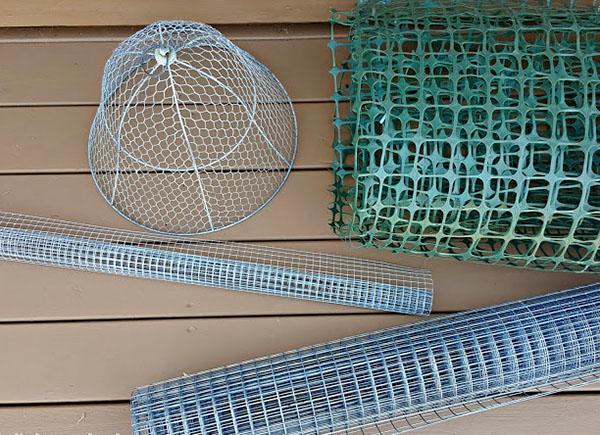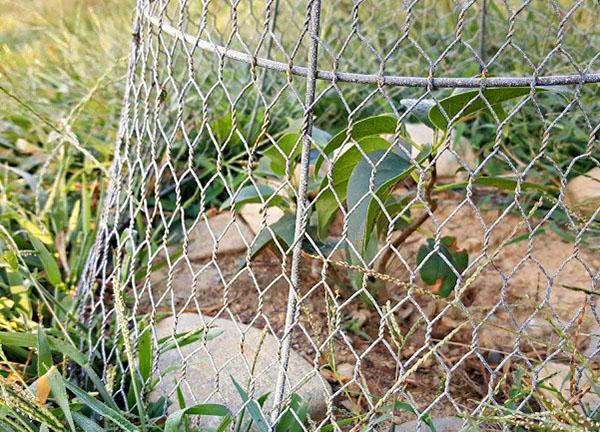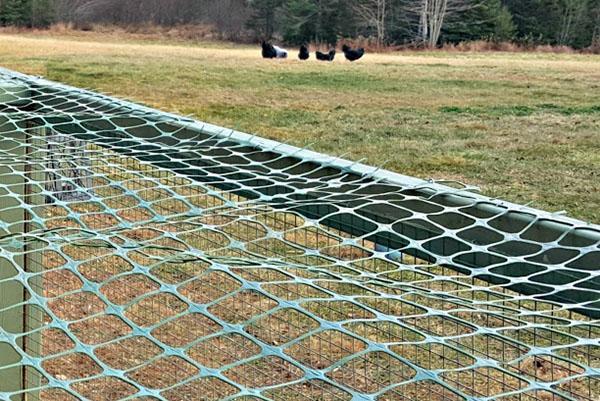Choosing the right fencing for your chicken coop, pen, garden or backyard
 Keeping your birds safe from predators is very important, especially if you are new to chicken breeding or when building or buying a new chicken coop, mobile coop or pen. In addition, you constantly have to protect vegetables in the garden from rabbits, deer and wild birds. There are a lot of types of fences, and often the wrong choice can lead to sad consequences. Read: how to make a pen for dogs with your own hands?
Keeping your birds safe from predators is very important, especially if you are new to chicken breeding or when building or buying a new chicken coop, mobile coop or pen. In addition, you constantly have to protect vegetables in the garden from rabbits, deer and wild birds. There are a lot of types of fences, and often the wrong choice can lead to sad consequences. Read: how to make a pen for dogs with your own hands?
Fine mesh wire mesh

The fine mesh is made from galvanized wire and is usually supplied with 1–2 ”(2.5–5.0 cm) hexagonal holes.
Fine mesh mesh should never be used on vents or vents, openings or windows. In addition, it is not suitable for corral if you leave chickens there all day when no one is at home.
The only thing a fine mesh net will do is to cover the walking area to protect chickens from flying predators during the day. It will not stop a raccoon or a weasel that can climb the net or get in by breaking the wire (at least it will take them some time). So, if you are at home during the day and you can see a corral from there, such a fence can be used to protect chickens, but only during daylight hours, and birds should be locked up at night. in the chicken coop... And if hawks are your concern, fine mesh netting is an affordable material to cover your pen.
Also, a fine mesh net is good for dividing the pen into zones (if you are introducing new birds into the flock, for example), or for separating a brood hen with its chickens from the general flock in a hen house.
Small mesh netting is a suitable option for protecting the garden from rabbits, deer, cats and chickens. And although chickens They can easily overcome obstacles with a height of 1.2–1.5 m, the instability of the net often keeps them from overcoming obstacles, since the birds do not have a stable support at the top from which they can jump down.
The fine mesh is great for protecting young plants until they get stronger. Mesh "cages" can be quickly and easily set up around them to protect plants from chickens, deer or rabbits.
Pros: a relatively inexpensive material that is easy to use, easy to cut, flexible, and great for garden fencing.
Minuses: unsuitable for protection from predators, rusts quickly enough.
Where is it better to use: for sheltering young plants, as a fence in the garden, vegetable garden, for covering the corral from above during daylight hours.
Plastic fine mesh
 This material is similar to the previous fine mesh mesh, but it is made of plastic. The sizes of the cells can be different. Such an inexpensive net can also only be used as a fence around a chicken coop to protect birds, or around a garden, vegetable garden, to protect the crop from wild birds, chickens, rabbits and deer.Being plastic, it is even less suitable for protection from predators than fine-mesh metal mesh. But at the same time, it is a lightweight and affordable material that can be used to cover your pen for the day.
This material is similar to the previous fine mesh mesh, but it is made of plastic. The sizes of the cells can be different. Such an inexpensive net can also only be used as a fence around a chicken coop to protect birds, or around a garden, vegetable garden, to protect the crop from wild birds, chickens, rabbits and deer.Being plastic, it is even less suitable for protection from predators than fine-mesh metal mesh. But at the same time, it is a lightweight and affordable material that can be used to cover your pen for the day.
Pros: the material is relatively inexpensive, easy to cut, easy to use, lightweight, flexible, strong enough.
Minuses: not suitable for protection from predators.
Where is it better to use: as a fence in the garden; to protect bushes, to cover the corral.
½ inch (1.27 cm) welded wire mesh
 Welded (or reinforced) mesh is the most reliable option for protecting your chicken coop and pen. It will protect chickens from attack not only by such large predators as dogs, coyotes and foxes, but also smaller dangerous animals, including ferrets, snakes and mice. This mesh is perfect for windows and vents in a chicken coop. If you want even more safety for your chickens, you can use a ¼ ”(0.6 cm) mesh, but keep in mind that it will take a very long time to cut.
Welded (or reinforced) mesh is the most reliable option for protecting your chicken coop and pen. It will protect chickens from attack not only by such large predators as dogs, coyotes and foxes, but also smaller dangerous animals, including ferrets, snakes and mice. This mesh is perfect for windows and vents in a chicken coop. If you want even more safety for your chickens, you can use a ¼ ”(0.6 cm) mesh, but keep in mind that it will take a very long time to cut.
I use ½ ”mesh on all openings in the coop - windows, vents, aisles, in addition, there are special fly screens on the windows of my coop.
I also use this mesh along the bottom of the paddock in the form of a 90cm high fence that is firmly buried in the ground. The presence of smaller openings at the bottom of the pen is a good additional protection, as most predators try to enter the chicken coop at the bottom of it or dig a passage under the fence. This net will keep your chickens and ducks safe from raccoon attacks, snakes and field mice.
Pros: protects against all predators.
Minuses:
- the material is quite expensive;
- takes a long time to cut;
- rigid, therefore difficult to bend.
Where is it better to use: vents, ventilation openings, windows; the lower part of the corral; to protect the enclosure from predators at night.
1 inch (2.54 cm) welded wire mesh
 I also use a mesh with this mesh size for an additional protective fence along the bottom of the pen - it will not allow predators such as raccoons or martens to climb the walls. In addition, this material is more affordable and easier to cut than ½ ”(1.27 cm) mesh.
I also use a mesh with this mesh size for an additional protective fence along the bottom of the pen - it will not allow predators such as raccoons or martens to climb the walls. In addition, this material is more affordable and easier to cut than ½ ”(1.27 cm) mesh.
Pros: protects against everyone, even the smallest predators; easier to cut than ½ ”mesh.
Minuses:
- the material is quite expensive;
- you have to spend a lot of time cutting;
- rather tough, therefore it bends poorly.
Where is it better to use: to protect the daytime pen.
1/2 '' x 1 '' (1.27 x 2.54 cm) welded wire mesh
 Another type of welded (reinforcing) mesh. If you can find such a material, it will be an excellent choice - it combines the high protective properties of ½ "mesh and the ease of cutting a 1" mesh.
Another type of welded (reinforcing) mesh. If you can find such a material, it will be an excellent choice - it combines the high protective properties of ½ "mesh and the ease of cutting a 1" mesh.
Pros: reliably protects against predators, is easier to cut, keeps its shape well.
Minuses:
- the material is quite expensive;
- rarely on sale;
- it takes time to cut;
- difficult to bend.
Where is it better to use: to protect the paddock at day or night.
Rabitz
 Another suitable material for your chicken coop. If you still have a pen from your old dog or some kind of chain-link fence, think about whether you can remake them for a chicken coop. You can provide better protection against predator attacks when you are not at home. To do this, you need to enclose the corral with a net with a smaller mesh size to a height of 60-90 cm. This will protect your birds from snakes, mice, ermines and raccoons. The sturdy netting is especially suitable for protecting the pen from larger and more powerful predators such as coyotes, lynxes, cougars and bears.
Another suitable material for your chicken coop. If you still have a pen from your old dog or some kind of chain-link fence, think about whether you can remake them for a chicken coop. You can provide better protection against predator attacks when you are not at home. To do this, you need to enclose the corral with a net with a smaller mesh size to a height of 60-90 cm. This will protect your birds from snakes, mice, ermines and raccoons. The sturdy netting is especially suitable for protecting the pen from larger and more powerful predators such as coyotes, lynxes, cougars and bears.
Pros: provides protection from the largest predators.
Minuses:
- does not keep small predators;
- difficult to reuse or resize.
Where is it better to use: to protect the enclosure from large predators during the day.
Electric fence
 If you are often bothered by large predators such as bears, cougars, or lynxes, your best bet is to get an electric fence. An electrified fence is installed around the enclosure fence - this double protection works reliably and provides even more safety for your chickens. Electric fencing can be used effectively when free-roaming chickens throughout the day or when changing places in which they roam.
If you are often bothered by large predators such as bears, cougars, or lynxes, your best bet is to get an electric fence. An electrified fence is installed around the enclosure fence - this double protection works reliably and provides even more safety for your chickens. Electric fencing can be used effectively when free-roaming chickens throughout the day or when changing places in which they roam.
While an electric fence will require a significant investment and ongoing health checks, it can provide a relatively large area for your chickens to safely walk.
Pros: reliably protects against large predators and provides a higher level of safety.
Minuses:
- expensive equipment;
- repair costs;
- the need for customization;
- does not protect against predators.
Where is it better to use: in spacious free areas; to ensure safety around the pen during the daytime.
Other protection methods
 The Nite Guard Solar Predator Lights can be used to provide additional protection for your chicken coop, garden or vegetable garden at night. It automatically turns on in the dark and blinks at dawn, which significantly increases the safety level of your chicken coop and the walking area, including protection from deer and raccoons that can get out of the corn thickets at night. In addition to additional protective measures, a prerequisite is the availability of suitable guards and constipation at night.
The Nite Guard Solar Predator Lights can be used to provide additional protection for your chicken coop, garden or vegetable garden at night. It automatically turns on in the dark and blinks at dawn, which significantly increases the safety level of your chicken coop and the walking area, including protection from deer and raccoons that can get out of the corn thickets at night. In addition to additional protective measures, a prerequisite is the availability of suitable guards and constipation at night.
Whichever type of fence you choose, it must be buried at least 20 cm into the ground. In addition, it must be installed with a slight outward slope or in the shape of the letter J. All this is necessary to prevent digging by predators. It is also a good idea to add stones, broken glass or ceramics, and hard construction debris to the ditches when digging in fences.
Fencing is not something to save on because it is about the safety of your chickens. By choosing quality materials, you can avoid many problems and losses in the future.